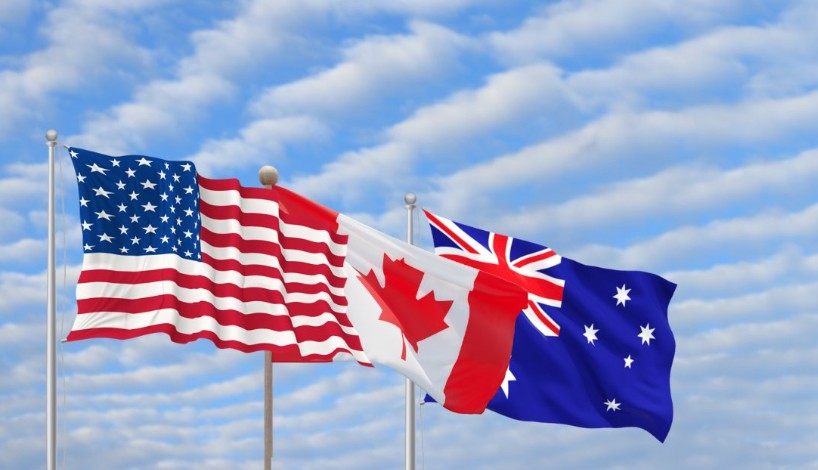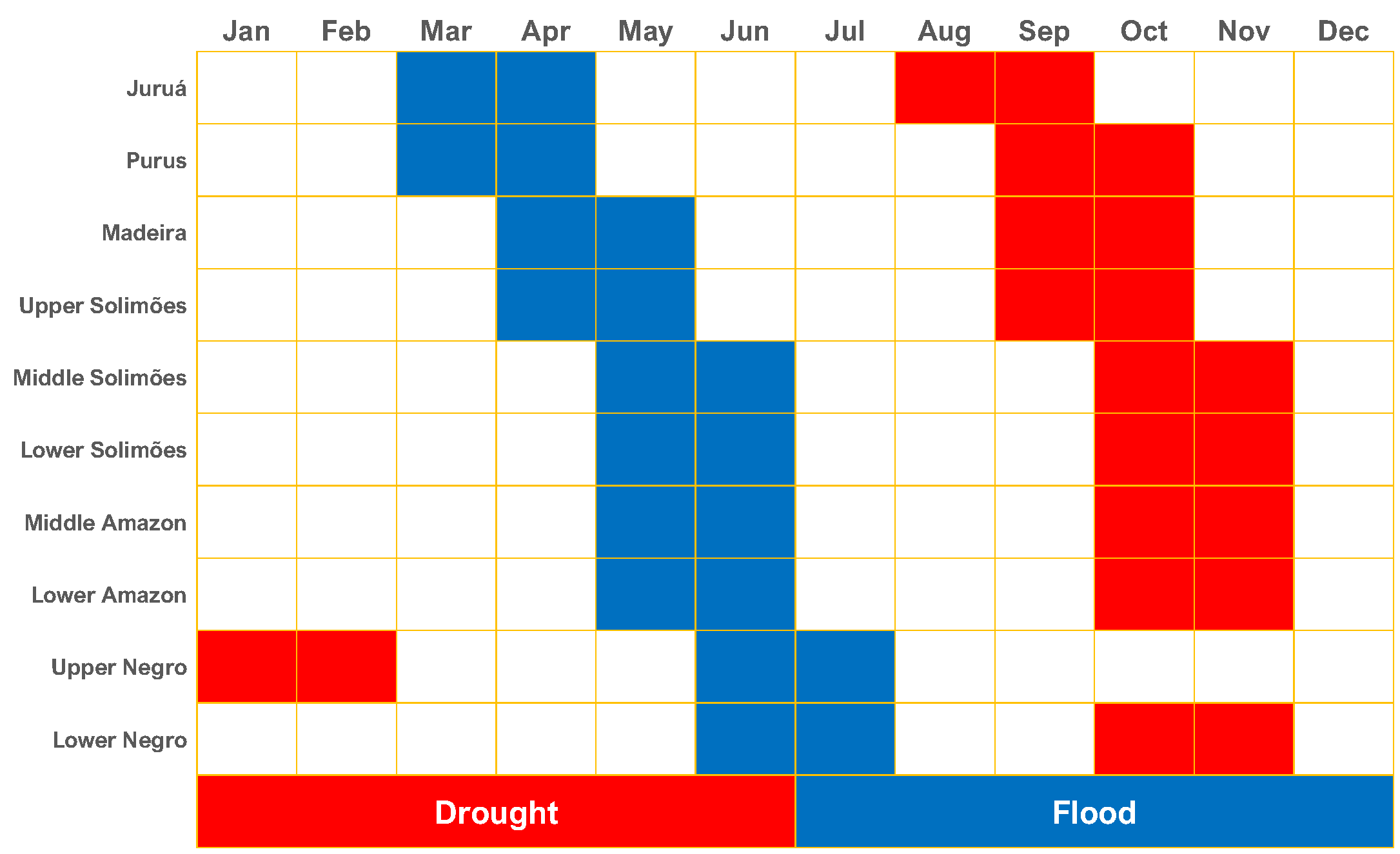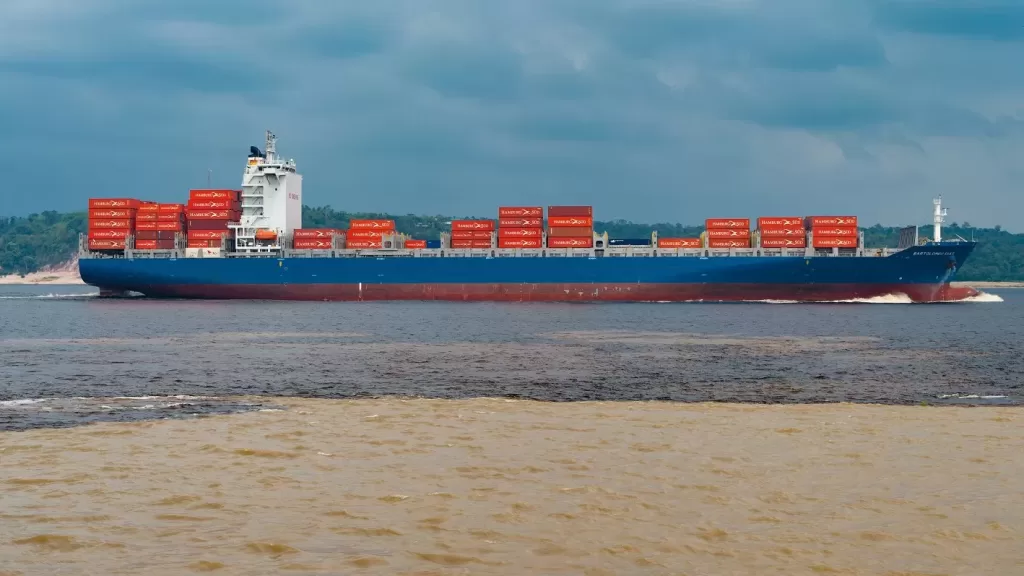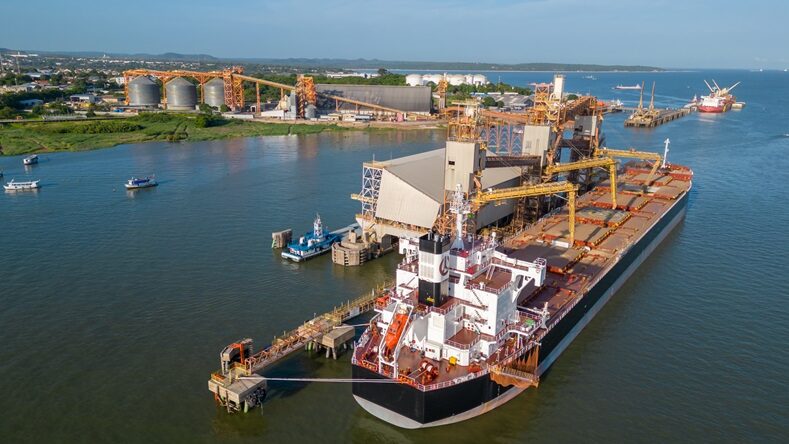
Visa exemptions for certain nationalities rei...
read more

Federal water agency predicts that this year’s dry season will lead to critically low river levels, potentially as bad as or worse than those experienced last year
In 2023, a severe drought pushed rivers to historically low levels, significantly impacting shipping in the inland waterways. Unfortunately, early signs indicate that this season may be even harsher, as levels in some navigable rivers in the upper Amazon are much lower than they were at this time last year.
The National Water and Sanitation Agency (ANA) has declared water shortages in the Madeira and Purus rivers and their tributaries, which are critical for navigation, hydroelectric generation, and public water supply. The measure was taken more than two months earlier than last year when the Amazon basin suffered its worst drought.
Recent reports from ANA and climatology institutes indicate that the upper Amazon accumulated below-average precipitation during the rainy season (from November 2023 to April 2024). This trend has continued into the current dry season, which started earlier than usual, and is expected to disrupt navigation to a similar or even greater extent than last year.

The drought hinders navigation in critical stretches, such as the mouth of the Madeira River, the confluence of the Solimões and Negro Rivers around Manaus, as well as downstream between Manaus and Itacoatiara, and on the Tapajos River between Itaituba and Santarém. Other regionally important waterways also suffer from drier-than-normal weather.
Manaus, the largest metropolis in the Amazon region, hosts the busiest container terminals in northern Brazil, where containers shipped from Asia and North America and transhipped in Central American ports are offloaded and carried to other national ports down the East Coast of South America on feeder vessels. Manaus is also home to the Manaus Free Trade Zone (ZFM), where consumer products are manufactured or assembled for distribution throughout the country via cabotage. The capital of the state of Amazonas is also an essential hub for the distribution of food, medicines and fuels in the Western Amazon.

However, due to the severe drought reducing the carrying capacity of the ocean-going ships, effective 1 August 2024, carriers offering liner services in the Amazon, including Aliança (A.P.Mollen-Maersk), Log-In, ONE, Mercosul Line (CMA CGM Group), and MSC are levying a temporary Low Water Surcharge (LWS) on the freight of all containers to or from the port of Manaus. If the river levels continue to drop as forecasted, containership traffic may be halted in a few weeks. In this scenario, containers bound for or arriving from Manaus will need to be transported by barge through the port of Vila do Conde (Barcarena), on the mouth of the Para River, east of the Amazon.
Amid last year’s drought crisis, instead of relying on barging between Manaus and Vila do Conde, some operators diverted containers destined for those Amazon ports to alternative ports on the northeast coast, such as Pecém and Suape, for onward carriage once river levels rise.
Over 20% of all grain exports from Brazil are shipped from the Amazon ports of Itacoatiara, Novo Remanso, Santarém, Santana (Macapa), and Vila do Conde (Barcarena). Although the drought does not change the draft limits at the grain terminals in the latter two ports, they are also affected due to disruptions in the barging of grains down the barge stations of Miritituba (Itaituba) in the Tapajos River and Porto Velho, in the Madeira River.
Corn and soya bean exports are forecast to remain very high this year, with the oilseed predicted to break production and export records in the 2024/25 season, keeping Brazilian grain ports busy. However, it is uncertain how much the critically low river levels will upset the throughput of the riverine ports of the Amazon.

At the height of last year’s drought, barging operations became unviable due to shallow waters, so traders had to redirect agriproducts, chiefly corn, through alternative ports down the coast, such as Itaqui, Santos, Paranagua, and Rio Grande. These ports are accessible by rail and road year-long and, therefore, are not susceptible to the seasonality of the rivers as the Amazon ports.
Over 90% of Brazil’s operating bauxite mines are in Pará. Bauxite shipments depart from the private port facilities of Mineracoes Rio do Norte (MRN), located on the right bank of the Trombetas River, and Alcoa, on the Juruti River. Although these dedicated bauxite terminals operate throughout the year, both have sailing draft restrictions that should be verified during passage planning.
Barge convoys transport mineral and agricultural commodities between cargo transhipment stations in Porto Velho and Miritituba (Itaituba), as well as other ports in the Amazon waterways. During the upcoming dry season, barging operations will continue, but the payload is expected to be reduced by more than half due to exceptionally shallow waters. In extreme cases, navigation down the Madeira may be suspended altogether for specific periods.

The maritime authorities monitor the river levels and receive regular feedback from regional pilot associations on changes to the depths and contours of charted shipping routes. They are expected to reduce draft limits and under-keel clearances (UKC) for cargo ships and convoys. Night navigation on critical stretches in the upper Amazon is anticipated to be temporarily prohibited.
Last year, the National Waterway Transport Agency (ANTAQ) eased procedures for chartering small ships for cabotage to mitigate the impact on supply and trade in the Amazon. It is foreseen that the federal regulator will take similar steps this season if the adverse outlook is confirmed.
The federal government has allocated funds for dredging and other works on critical stretches of the Madeira and Solimões rivers and along the Tabocal Passage on the Amazon near Itacoatiara. Although initiatives were promised to commence in the second half of 2024, they have not yet started.
River transport plays a crucial role in the socioeconomic development of the Amazon region, particularly along the Madeira and around the metropolitan area of Manaus. In addition to flowing goods – including agricultural and mineral commodities for export and supply of food, medicines and fuels – rivers are the main access routes for many riverside communities, enabling them to access essential services such as healthcare and education.
Hindrances to river navigation significantly impact transportation costs, the supply of industrial inputs to the ZFM, and the distribution of manufactured goods to other parts of Brazil via cabotage.
Draft limitations vary according to the port facility involved and are ultimately dictated by the draft restrictions at the North Bar for vessels leaving the ports upstream of the Amazon River or at the mouth of the Pará River for vessels departing Vila do Conde (Barcarena) and Belém, as explained in this article.
Seasonal drought in the Amazon Basin varies depending on the region. It typically starts in July and lasts until December, reaching its peak between September and November. As water levels change daily due to the prolonged drought, ships calling the Amazon ports should check prevailing limitations with their local agents and terminal operators before entering the river.
Please read our disclaimer.
Related topics:
Rua Barão de Cotegipe, 443 - Sala 610 - 96200-290 - Rio Grande/RS - Brazil
Telephone +55 53 3233 1500
proinde.riogrande@proinde.com.br
Rua Itororó, 3 - 3rd floor
11010-071 - Santos, SP - Brazil
Telephone +55 13 4009 9550
proinde@proinde.com.br
Av. Rio Branco, 45 - sala 2402
20090-003 - Rio de Janeiro, RJ - Brazil
Telephone +55 21 2253 6145
proinde.rio@proinde.com.br
Rua Professor Elpidio Pimentel, 320 sala 401 - 29065-060 – Vitoria, ES – Brazil
Telephone: +55 27 3337 1178
proinde.vitoria@proinde.com.br
Rua Miguel Calmon, 19 - sala 702 - 40015-010 – Salvador, BA – Brazil
Telephone: +55 71 3242 3384
proinde.salvador@proinde.com.br
Av. Visconde de Jequitinhonha, 209 - sala 402 - 51021-190 - Recife, PE - Brazil
Telephone +55 81 3328 6414
proinde.recife@proinde.com.br
Rua Osvaldo Cruz, 01, Sala 1408
60125-150 – Fortaleza-CE – Brazil
Telephone +55 85 3099 4068
proinde.fortaleza@proinde.com.br
Tv. Joaquim Furtado, Quadra 314, Lote 01, Sala 206 - 68447-000 – Barcarena, PA – Brazil
Telephone +55 91 99393 4252
proinde.belem@proinde.com.br
Av. Dr. Theomario Pinto da Costa, 811 - sala 204 - 69050-055 - Manaus, AM - Brazil
Telephone +55 92 3307-0653
proinde.manaus@proinde.com.br
Rua dos Azulões, Sala 111 - Edifício Office Tower - 65075-060 - São Luis, MA - Brazil
Telephone +55 98 99101-2939
proinde.belem@proinde.com.br